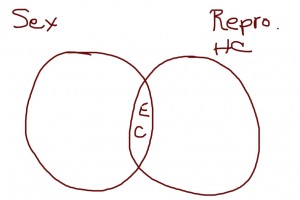I’ve been silent on this issue mainly because I’ve been too busy raising money to update this blog with responses to news as it happens, but as National Organization for Women president Terry O’Neill noted the debate over emergency contraception hasn’t stopped.
In her op-ed earlier this month in The Huffington Post, O’Neill argues that although parents are rightfully “wiggy†about young girls having sex, they should see Plan B now being available over the counter to all women and girls of reproductive age as an increase in access to emergency health care, something no responsible parent would deny his or her child. She says that in debates about women’s health care and reproductive justice, parents (but everyone else, too) often make the mistake of “conflating two separate conversations. One is about sex. The other is about health care.â€
While I agree that few parents would deny their children emergency medical care, I disagree with O’Neill on several other points. 1) The conversations look more like a Venn Diagram than they do two separate stacks. You can no more separate a discussion about reproductive health care from one about sex than you can talk about HIV/AIDS without mentioning intravenous drug use or condoms. They have their areas where they’re not related, but in some places they meet. A woman or girl seeking emergency contraception isn’t running to the drug store because she has second thoughts about her choice from the sperm bank. She’s there because she had unprotected sex or was raped and she wants to prevent pregnancy.
2) She’s wrong when she writes, “Is it inappropriate for 14-year-old girls to be having sex? Of course it is.†In a society in which women have shattered every glass ceiling except the executive branch of government, 14-year-olds having sex is socially and culturally unacceptable. But biologically, historically and in the kind of society I would be banished from—it IS appropriate. Menarche hasn’t caught up to our changing times yet, and all those sexual feelings we get at puberty still come without regard to whether we live in a country that has opportunities for women. (Side note: If I were in the hard sciences, I would be trying to find out if eliminating teen pregnancy would cause women to evolve to delay menarche until they’re adults.)
3) I also think O’Neill is wrong to frame the E.C. debate in terms of parents restricting health care for their daughters. Parents aren’t getting the chance to decide what they’ll do in this situation. The previous Health and Human Services decision to not allow girls under age 15 to purchase Plan B without a prescription didn’t withhold health care; it just said parents and pediatricians have to be involved in a girl’s health care decisions.
And that, like everything else about adolescence, sends mixed messages. A 14-year-old girl is physically and biologically able to have a baby but not ready for sex or parenthood. She can choose her wardrobe but can’t drive herself to the store or buy clothes with her own money, because she’s too young to work. Parents are trying to teach her how to make responsible choices by giving her leeway to make mistakes, but the choices she gets are about their rules, not about the decisions she’ll face when she’s on her own. Her parents and mentors want her to know her body is her own, so that she knows no one has a right to touch her in a way she doesn’t want to be touched, but not so much her own that she can do everything she wants to with it. Change is exhilirating, but it sucks.
Those little sections, that little bit of overlap between reproductive care and sex and between childhood and adulthood, that’s what really makes Plan B “wiggy.â€

